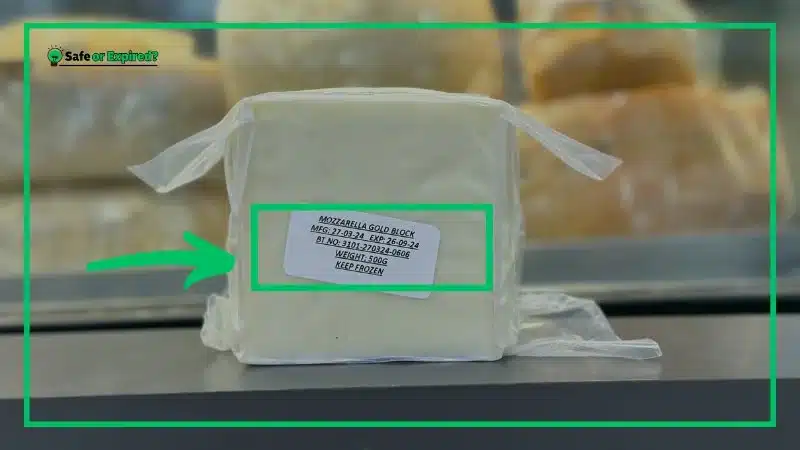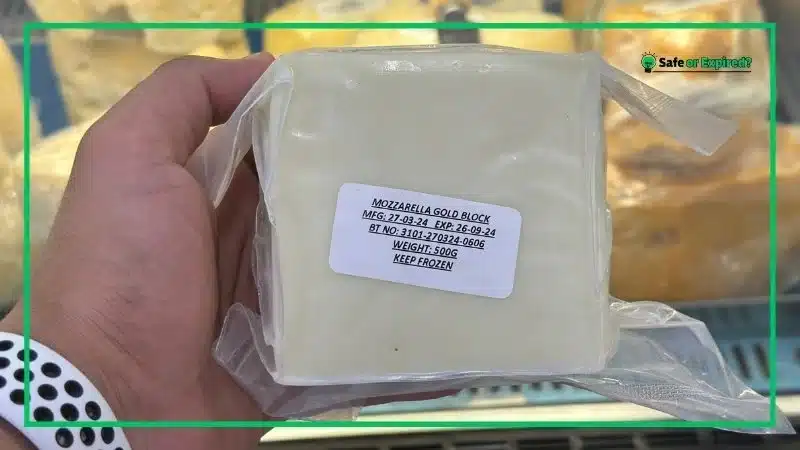“What happens if you eat expired mozzarella cheese?” is a valid concern for anyone cleaning the fridge. Well, you could get sick with symptoms like stomach cramps, vomiting, and diarrhea. That’s why it’s important to know the signs of spoiled cheese to avoid these risks. Stay with me, and you’ll learn all you need to know to enjoy mozzarella safely!
What Happens if You Eat Expired Mozzarella Cheese?
Eating expired mozzarella cheese can cause food poisoning, leading to symptoms like stomach cramps and diarrhea. The severity of these symptoms depends on how expired the cheese is and how much you consume. It’s always best to check for signs of spoilage and the expiration date printed on the packet to stay safe.

Stomach Cramps and Pain
When you eat expired mozzarella cheese, one of the first things you might notice is stomach cramps and pain. This happens because your body is trying to fight off the harmful bacteria, like Salmonella, that have grown in the cheese. These cramps can be quite uncomfortable and may last for several hours.
Vomiting and Nausea
Vomiting is another common effect of eating expired mozzarella cheese. Your body recognizes that something harmful has been ingested and tries to get rid of it by making you vomit. This can be very unpleasant and might last for a few hours.
Along with vomiting, you might also feel nauseous, which is a feeling of wanting to throw up. This is your body’s way of protecting you, but it’s not fun at all. If you feel nauseous, try to rest and drink small sips of water to stay hydrated.
Diarrhea and Digestive Issues
Diarrhea is another sign that your body is dealing with bad bacteria from expired mozzarella cheese. This can be very uncomfortable and may lead to dehydration if it lasts too long. Diarrhea happens because your body wants to flush out the harmful substances quickly.
If you experience diarrhea, make sure to drink lots of water and maybe some electrolyte drinks to replace lost fluids. Eating bland foods like bananas, rice, and toast can also help your stomach feel better.
Weakness and Fatigue
Eating expired mozzarella cheese can make you feel weak and tired. This happens because your body is using a lot of energy to fight off the harmful bacteria. You might feel like you have no energy to do anything and just want to lie down.
Rest is important during this time to help your body recover. Make sure to drink enough fluids and eat light, easy-to-digest foods until you feel better.
By understanding these effects, you can see why it’s important to avoid eating expired mozzarella cheese. Always check the expiration date and look for signs of spoilage before eating cheese to keep yourself safe and healthy.
How Long Does Mozzarella Last After Use by Date? Detailed Breakdown
Mozzarella typically lasts 1-2 weeks past its use-by date, depending on the type of mozzarella. However, its quality and safety can decrease over time. Check for signs of spoilage, such as a sour smell before consuming. For the best quality, consume it as close to the use-by date as possible.
Here’s a table:
| Type of Mozzarella | Unopened Shelf Life After Use-By Date | Opened Shelf Life |
| Fresh Mozzarella | 1-2 days | 1-2 days |
| Shredded Mozzarella | Up to 1 week | 5-7 days |
| Block Mozzarella | Up to 2 weeks | 1 week |
Fresh Mozzarella
If you have fresh mozzarella, you need to be extra careful. Fresh mozzarella is the soft kind, usually packed in water. It lasts about 1-2 days past the use-by date if it’s unopened and kept in the fridge.
But once you open it, try to eat it within a day or two. If you notice it getting slimy or smelling sour, it’s time to throw it out. Fresh mozzarella is super delicate, so always keep an eye on it.
Shredded Mozzarella
Shredded mozzarella, like the kind you put on pizza, is a bit more durable. If it’s unopened, it can last about a week past the use-by date in the fridge. After you open it, it’s best to use it within 5-7 days.
Make sure to keep the bag sealed tight to keep it fresh. If it starts to smell funny or if you see any mold, toss it out. Nobody wants moldy cheese on their pizza!
Block Mozzarella
Block mozzarella is another type you might have. This kind is firmer and lasts longer. If you haven’t opened it yet, it can last up to 2 weeks past the use-by date in the fridge. After you open it, you should try to use the block cheese within a week. However, it’s better to consume it within the “Expiration date” printed on the label.

Keep it tightly wrapped in plastic wrap or put it in a sealed container to keep it fresh. And remember, if it smells off or has mold, it’s time to let it go.
People often ask, “Can I eat Mozzarella 2 weeks out of date?” If your mozzarella is two weeks out of date, be very cautious. Two weeks is quite a bit of time for cheese to start spoiling.
Another query I get is, “Can I use Unopened mozzarella cheese past expiration date?” Well, the answer is – Eating unopened expired mozzarella cheese can make you sick, so be careful. If it’s only a few days past the expiration date and it looks, smells, and tastes fine, it might be okay to eat.
But if it’s been expired for a longer time, like weeks, it’s best to avoid it.
While thinking about the risks of expired mozzarella, it’s important to clarify some common misunderstandings. Discover the truth behind food storage myths in 10 Food Preservation Myths Debunked: Know the Facts.
How to Tell If Mozzarella Cheese Has Gone Bad?
You can tell if mozzarella cheese has gone bad by checking for changes in smell, texture, and appearance. Bad mozzarella will smell sour, feel slimy, and may have mold. If you notice any of these signs, it’s best not to eat it to avoid getting sick.
Sour Smell
The first thing you should do is smell the mozzarella. Fresh mozzarella smells mild and milky. If it smells sour or has a strong, unpleasant odor, it’s probably gone bad. Your nose is a great tool for spotting spoiled food.
A sour smell means bacteria have started to grow, and it’s no longer safe to eat. Always trust your nose because it’s usually right about bad food.
Slimy Texture
Another way to tell if mozzarella cheese has gone bad is by touching it. Fresh mozzarella should feel soft and a little springy. If it feels slimy or sticky, it’s a sign that bacteria have started to grow on it.
This slimy texture is a clear sign that you should throw the cheese away. Eating slimy cheese can make you sick, so it’s best to avoid it. Always wash your hands after handling spoiled cheese to avoid spreading bacteria.
Mold Appearance
Look closely at the mozzarella for any signs of mold. Mold can be white, green, blue, or black. If you see any mold spots on the cheese, don’t eat it. Mold means the cheese has gone bad and is no longer safe to eat.
Sometimes, mold can grow inside the cheese and might not be visible right away. So if you see mold on the outside, it’s best to throw the whole cheese away.
Discoloration
Fresh mozzarella is usually white or pale. If you notice any strange colors, like yellow or brown, it’s a sign the cheese has gone bad. This discoloration happens when the cheese starts to spoil and is no longer safe to eat.
Always check the color before eating mozzarella. If it looks different from when you bought it, it’s best to throw it out. Keeping an eye on the color can help you avoid eating spoiled cheese.
Off Taste
If the mozzarella cheese passes the smell, touch, and look tests but you’re still unsure, try tasting a small piece. Fresh mozzarella should taste mild and creamy. So, What does expired mozzarella taste like?
If it tastes sour, bitter, or just off, spit it out and don’t eat anymore. Bad cheese will have an unpleasant taste that’s easy to recognize.
Trust your taste buds—they’re good at spotting spoiled food. If it doesn’t taste right, it’s best to throw it away to stay safe.
By checking for these signs, you can easily tell if mozzarella cheese has gone bad and avoid eating spoiled food. Always trust your senses to keep yourself safe and healthy.
Just like mozzarella, margarine also has a shelf life. Find out how to tell if it’s gone bad in Can Margarine Expire? How to Identify Spoilage.
Can You Eat an Out of Date Mozzarella Ball?
You can eat an out-of-date mozzarella ball if it’s within 1-2 weeks past the use-by date and has been stored properly in the refrigerator. However, its texture and flavor may not be as fresh. It’s best to consume mozzarella as close to the use-by date as possible for optimal taste.
4 Tips for Storing Mozzarella Cheese Safely
Store mozzarella cheese in the fridge at a consistent, cool temperature. Keep fresh mozzarella in its liquid, and seal shredded or block mozzarella tightly in plastic wrap or a sealed container. Always check for signs of spoilage before using.
Keep It in the Fridge
The first tip for storing mozzarella cheese is to always keep it in the fridge. Mozzarella needs to stay cool to stay fresh. The fridge should be set to a consistent temperature below 40°F (4°C). This prevents bacteria from growing on the cheese and keeps it safe to eat.
When you get home from the store, put the mozzarella in the fridge right away. Don’t leave it sitting out on the counter. Keeping it cool is the best way to make sure it stays fresh and tasty.
Store Fresh Mozzarella in Liquid
If you have fresh mozzarella, the kind that comes in a ball or in water, you need to store it in its liquid. The liquid helps keep the cheese moist and fresh. If you’ve opened the package, change the water every day to keep it clean.
Just pour out the old water and add fresh, cold water. This helps the cheese stay good for longer. If you don’t have any more liquid, you can make a brine with water and a little bit of salt. This will help keep the mozzarella fresh and delicious.
Seal Shredded or Block Mozzarella Tightly
For shredded or block mozzarella, it’s important to keep it tightly sealed. Air is the enemy of cheese because it can make it dry out and spoil faster. If the original packaging can’t be sealed again, put the cheese in a plastic bag or an airtight container.
This keeps the cheese fresh and prevents it from picking up any weird smells from other foods in the fridge. Keeping it tightly sealed is a simple but effective way to store your mozzarella.
Use Freezer for Long-Term Storage
If you won’t use your mozzarella cheese right away, you can freeze it to make it last longer. Shredded mozzarella freezes best because you can use it directly from the freezer without thawing. Put the shredded cheese in a freezer bag and squeeze out the air before sealing it.
You can also freeze block mozzarella, but it might change texture a bit when thawed.
Concerned about other dairy products too? Learn how long string cheese lasts and how to store it right with Does String Cheese Go Bad? Top 5 Storage Tips.
What to Do If You’ve Eaten Expired Mozzarella Cheese?
If you’ve eaten expired mozzarella cheese, monitor for symptoms like stomach pain, nausea, vomiting, or diarrhea. If symptoms persist, you should not hesitate to seek medical attention. For future prevention, always check expiration dates and store cheese properly to avoid spoilage.
Monitor for Symptoms
The first thing to do if you’ve eaten expired mozzarella cheese is to monitor yourself for any symptoms of food poisoning. Common symptoms include stomach cramps, nausea, vomiting, and diarrhea. These symptoms can appear within a few hours or may take a day to show up.
Pay close attention to how you feel. If you notice any of these symptoms, it’s important to rest and take care of yourself. Sometimes, you might not feel sick at all, but it’s always good to be cautious.
Drink Plenty of Water
Staying hydrated is very important if you have eaten expired mozzarella cheese. Drinking plenty of water helps your body flush out any harmful bacteria. If you have vomiting or diarrhea, you’ll need to drink even more water to replace the fluids you’re losing.
Small sips of water, clear broths, or oral rehydration solutions can help keep you hydrated. Avoid sugary drinks and caffeine as they can make dehydration worse. Keeping hydrated can help you feel better faster.
Rest and Recover
Your body needs time to fight off any bad bacteria, so it’s important to rest. Try to take it easy and avoid any strenuous activities. Lie down if you feel weak or dizzy. Resting helps your body focus on getting rid of the toxins.
Watching a movie or reading a book can help distract you and make the time pass more comfortably. Give your body the chance to recover fully before getting back to your regular activities.
Eat Bland Foods
If you’re feeling hungry but still have symptoms, stick to bland foods. Foods like bananas, rice, applesauce, and toast are gentle on your stomach and can help you feel better. Avoid spicy, fatty, or fried foods as they can make your symptoms worse.
Eating small amounts of bland food can help settle your stomach and give you some energy. Once you start feeling better, you can gradually return to your normal diet.
Contact a Doctor if Necessary
If your symptoms become severe or don’t start to improve after a day or two, it’s important to contact a doctor. Severe symptoms include high fever, bloody stools, or persistent vomiting that prevents you from keeping any fluids down.
A doctor can give you the best advice and may prescribe medication to help you feel better. Don’t hesitate to seek medical help if you’re worried about your symptoms. Your health is the most important thing, and it’s always better to be safe.
Conclusion
Eating expired mozzarella cheese can lead to food poisoning and unpleasant symptoms. To keep yourself safe, remember these key points:
- Smell: A sour smell means it’s gone bad.
- Texture: Slimy or sticky cheese is unsafe.
- Appearance: Mold or discoloration is a clear no-go.
- Taste: Off-taste means it’s time to throw it out.
- Storage: Keep it in the fridge and check for spoilage regularly.
By following these tips, you can enjoy mozzarella cheese without any worries. Stay safe and enjoy your delicious cheese!

